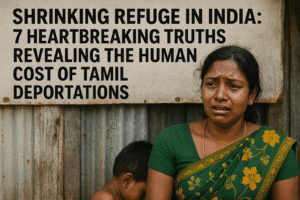Shrinking Refuge in India: 7 Heartbreaking Truths Revealing the Human Cost of Tamil Deportations
India’s Supreme Court has callously dismissed a former LTTE member’s plea to remain with his critically ill wife and ailing son in India, ordering his deportation. The court bluntly told his lawyer, “then go to some other country,” ignoring credible fears of persecution in Sri Lanka and invoking India’s population size to reject refugee protection. This ruling reinforces a disturbing pattern following a similar Rohingya rejection, signaling a severe narrowing of refuge in India. It condemns approximately 91,400 Eelam Tamil refugees – many survivors of Sri Lanka’s genocidal 2009 offensive – to perpetual uncertainty without citizenship pathways.
Decades after fleeing, these individuals remain trapped in legal limbo, subject to surveillance and sudden expulsion, despite deep cultural ties to India. The verdict prioritizes bureaucratic citizenship doctrine over fundamental humanitarian needs and the constitutional right to life, fracturing a vulnerable family and abandoning a historically protected community. This decision marks a profound erosion of India’s moral responsibility toward persecuted neighbors.

Shrinking Refuge in India: 7 Heartbreaking Truths Revealing the Human Cost of Tamil Deportations
The gavel’s echo in India’s Supreme Court this week resonated far beyond the legal petition it dismissed. It struck a chilling chord for tens of thousands of Eelam Tamil refugees who have sought sanctuary in India for decades. The Court’s blunt dismissal of a former LTTE member’s plea to stay with his critically ill wife and ailing child – capped by the instruction “then go to some other country” – lays bare a hardening reality: India’s doors to refuge are closing fast.
A Plea Rooted in Desperation, Met with Doctrine
The petitioner wasn’t asking for citizenship, but merely the chance to remain. His story is a tapestry of human suffering: a wife battling serious illness, a son with a congenital heart defect, and the ever-present shadow of potential torture or death if returned to Sri Lanka due to his past LTTE affiliation – a group India itself banned. His lawyer anchored the appeal in Article 21 of the Indian Constitution, the fundamental right to life and personal liberty, arguing deportation threatened both.
The Court’s response was unequivocal. Justice Dipankar Datta invoked India’s vast population (“140 crore”) and declared the nation cannot be a “dharamshala” (a charitable rest house) for the world’s displaced. The right to reside (Article 19), the Court ruled, belongs solely to citizens. Humanitarian pleas, however compelling, were deemed insufficient against the doctrine of national sovereignty and citizenship.
More Than One Case: A Pattern of Exclusion
This decision isn’t isolated. It follows swiftly on the heels of the Court rejecting a similar plea from Rohingya refugees. Together, they signal a deliberate and narrowing interpretation of India’s obligations towards those fleeing persecution, even towards communities with deep, centuries-old ties to India – sharing language, culture, and ethnicity.
The Precarious Limbo of Eelam Tamils
For the approximately 91,400 Eelam Tamils in India (58,200 in camps, 33,200 outside), this ruling intensifies an already agonizing uncertainty. Most fled the harrowing final stages of Sri Lanka’s civil war in 2009, escaping what mounting evidence suggests constituted genocide. They arrived seeking safety, many as children or young adults.
- Decades in Limbo: Despite living in India for 15, 20, or even 30 years, there exists no legal pathway to citizenship or permanent residency.
- The Ambiguity Trap: While many have Aadhaar cards or bank accounts, few possess valid Sri Lankan documents. Their status remains perpetually “temporary,” subject to surveillance and the constant threat of deportation.
- A Continuing Exodus: Conditions in Sri Lanka – economic collapse, rampant militarization, land grabs, and targeted harassment – continue to push Tamils onto rickety boats across the Palk Strait towards the very shores now telling them, “Go somewhere else.”
The Unanswered Questions and the Human Toll
The Court’s directive – “go to some other country” – rings hollow against the harsh realities of global asylum:
- Which Country? What viable, safe “other country” exists for a former LTTE member fearing persecution, with a critically ill family in tow? The global asylum system is strained and often inaccessible.
- The Family Fracture: Deporting the petitioner means tearing him away from his sick wife and child, who remain in India. What becomes of their care? What becomes of his safety?
- Ignoring History & Identity: Does India’s long-standing cultural and linguistic kinship with the Tamils of Eelam impose no moral responsibility, especially given the nature of the persecution they fled?
A Call for Clarity and Humanity
Tamil refugee rights advocates have long pleaded for India to formally recognize the specific persecution faced by Eelam Tamils and to establish a transparent legal framework for their protection. The current approach – ad hoc detention, perpetual uncertainty, and now, judicial dismissal of profound humanitarian need – is unsustainable and inhumane.
The Real Value of the Story
This ruling isn’t just about legal technicalities or population statistics. It’s about:
- The erosion of refuge: It signifies a retreat from historical, albeit unofficial, sanctuary offered to persecuted neighbors.
- The primacy of bureaucracy over humanity: When the right to life is weighed against citizenship status and loses, a fundamental moral line is crossed.
- The crushing weight of indefinite limbo: For tens of thousands, this decision reinforces that their lives in India remain perpetually provisional, their futures perpetually insecure, regardless of roots put down or children raised.
The Supreme Court’s words, “go to some other country,” may resolve a single legal case, but they deepen the crisis of conscience for a nation grappling with its identity and its responsibilities in an increasingly displaced world. The human cost of this shrinking refuge is paid daily in the anxiety-filled corridors of Tamil Nadu’s camps and the fragile homes beyond their fences.
You must be logged in to post a comment.